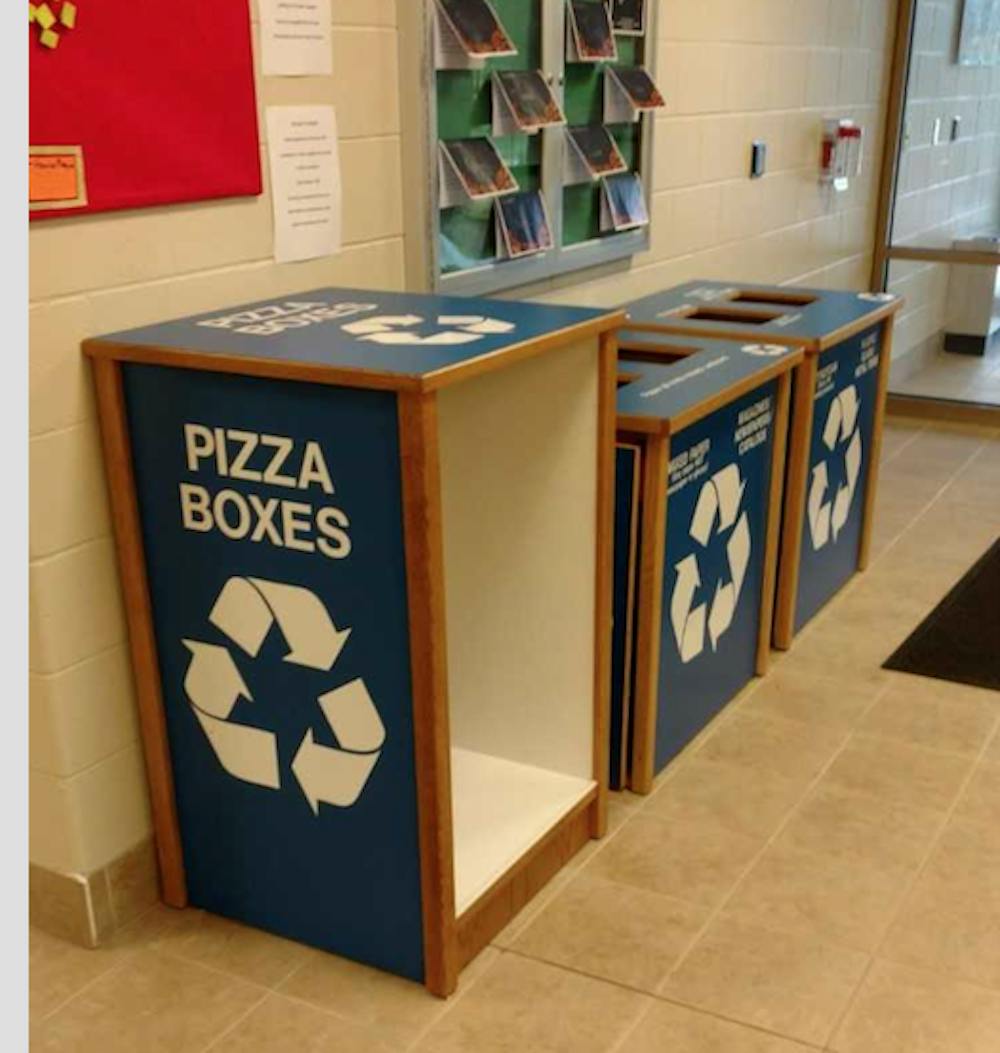Pizza box composting incorporated in Residence Halls
Central Michigan University is considered to have one of the best composting programs in the nation, said Facilities Operation Director Jay Kahn.
To increase their sustainability initiatives this year, CMU started a pizza box composting program.
“CMU is so great at composting because we collect both pre-consumer waste and post-consumer waste,” Kahn said.
Pre-consumer waste is waste produced by making a meal and post-consumer waste could be food scraps after a meal.
Previously, pizza boxes were exempt from recycling because the box gets contaminated by grease and pizza toppings that get stuck to the top of the box. Therefore, CMU started composting the pizza boxes.
The Student Sustainability Coalition presented the idea of pizza box composting to the university’s sustainability committee last year. The SSC consists of students that are committed to sustainability and include representatives from Student Government Association and Residence Hall Assembly among others.
The pizza box composting initiative was spearheaded by Assistant Director of Residence Life, East Community Grant Skomski, who hopes to reduce CMU's waste.
“We decided we could (compost pizza boxes) as an effort to capture waste that shouldn’t be going to a landfill,” Skomski said. “We came up with a product design last year and this past summer John Kassuba built the first prototype.”
Kassuba is the Assistant Director of Facilities Operations and is part of this initiative.
This summer a pizza box collection post was set up in the Towers residence hall community, utilizing the large student population there for testing.
The building maintenance worker staff puts the pizza boxes in biodegradable bags, which are then taken to compost collection points located by the loading docks of each residential restaurant. The bags are picked up three times a week, Skomski said.
Each quad and campus apartment area has at least one BMW worker.
CMU's ground maintenance department hauls the composted material to Morgan's Composting in Sears, Michigan, Kahn said.
“(Kassuba) has made four more prototype pizza box collection (posts that) we are going to expand,” he said. “The ultimate goal is to have pizza box collection points throughout our system in residence life to help the campus more (with sustainability efforts).”
Both Kahn and Skomski said the sustainability initiative of composting pizza boxes is going well because students are using the collection box. Despite this, there are still some challenges.
Jonathan Webb, associate vice president of facilities management, said the biggest challenge is working out the details of the new initiative.
“It takes research, gathering of facts, developing an actionable plan, securing resources and a commitment to execute the plan,” Webb said.
Skomski said if the boxes aren't picked up right away, bacteria builds up and there is a risk of animals getting into the composting.
“It’s got to be a clean process within the residential halls until we get it out to the composting area," he said.
Challenges not only come with pizza box composting, but to sustainability overall at CMU.
“The biggest challenge that CMU faces is the same challenge that every university faces, which is that we graduate 20 percent of our population and the next year we bring in 20 percent of a fresh new population,” Kahn said. “That means that we have a constant education and outreach challenge because we are turning our population over every single year.”
CMU brings in students that are not native to Isabella County, which makes it difficult in regards to sustainability because every city has its own rules for recycling, he said.
Some cities don’t have recycling at all and some have one-stream recycling where everything gets put into one container. Isabella County has double-stream recycling where there are separate containers for paper and plastic products.
To educate CMU students about the recycling procedure in Isabella County, Skomski said the university focused on more descriptive signs near the dumpsters that let people know what goes in each door of the bins.
Skomski said another challenge is getting students to care about sustainability and recycling.
“It’s all a learning curve and how you pay attention to it,” he said.
CMU is trying to increase its diversion rate by composting and recycling as much as they can.
“The diversion rate is what you don’t put in the landfill," Kahn said. "So, the higher the rate, the more sustainable you are. Right now, CMU is at a 40 percent diversion rate.”
CMU has a considerably higher sustainability rate compared to the entire state of Michigan, which is at 15 percent.
“The reason why Michigan’s diversion rate is so low is because Michigan is an importer of trash,” Kahn said. “Our landfill tipping fees are so low that it’s profitable for people – even Canada – to send their trash to Michigan rather than stick it in their own landfills.”
Although Michigan as a state has a low diversion rate, Skomski said Michigan has a goal of a 45 percent rate for public universities.
“(CMU is) becoming less of a polluter which is great, but we could do a lot more,” Kahn said. “A 40 percent diversion rate is almost three times better than the state average, but the difference between 40 percent and 45 percent is not that much and we could really be at 45 percent if we practice what we preach.”







